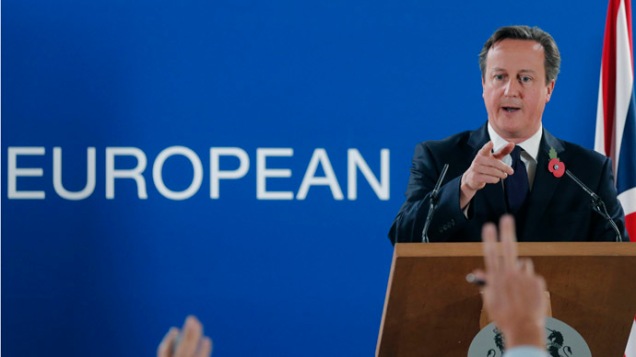Janet Daley has a good piece in the Telegraph today, castigating the Tories for the way in which David Cameron’s government is rapidly turning the serious question of Britain’s future in the European Union into a farcical “pantomime”.
Taking the government to task for letting down those people who ‘kept the faith’ and voted Conservative in May, Daley laments:
But what a dispiriting carry-on it must seem to most voters, especially the ones who were really happy that they had kept their nerve and voted Conservative.
But here’s the money quote:
But our EU membership did not create the non-contributory benefit system in which people who have never paid in receive indefinite support. Nor did it give rise to our unique universal, free at the point of use, rationed health care system. And it certainly was not responsible for the poor educational achievements of so many young British people that companies prefer to import labour rather than cope with the shortcomings of our school standards.
This hits at an important question. Why is it that we want Britain to leave the European Union in the first place? And why do we actually want to unshackle ourselves from an international “human rights” mechanism that has been hijacked and turned into little more than a guarantor of social democratic dogma?
As these endless debates rumble on, more and more it seems that we argue about these great matters for their own sake. Let’s leave the EU because it’s awful! Let’s stay in the EU because to do otherwise would make us Little Englanders!
But isn’t there more to it than this?
In truth, there is very little point in Britain leaving the European Union or repealing the Human Rights Act at all if we do not seize the opportunity to move in different political direction – if what replaces them is nothing more than a British version of the same failed policies and institutions.
Yes, it’s wrong that the European Union has sovereignty over member states despite there never having been any popular demand within these countries for the creation of such an ever-tightening political union. But ultimately, it’s what Britain does once we free ourselves from the EU that matters most – and which offers the only way of winning the Brexit referendum.
Will Britain leave the European Union only to keep the same vast body of social and employment policies which meddle in our daily affairs and suffocate enterprise currently laid down by the EU? If so, there is no point in leaving.
(An argument can be made that Britain should initially keep the main body of EU law upon secession in order to reduce the shock and potential negative consequences of withdrawal, repealing amendments in politically manageable chunks in following months – though the drawbacks to such a method are also self-obvious).
And yes, it’s wrong that the notion of “human rights” has been hijacked and bastardised to mean permanent, inalienable entitlements to government benefits or the immunity of criminals from deportation. But what will happen if David Cameron and Michael Gove get their way and repeal the act? Is there not a very great danger that we might end up with almost all of the same paternalistic, nanny-state, infantilising measures shoehorned into British law by another route?
Whether it’s Brexit or the British Bill of Rights, the principles and big yes/no questions are important, of course. But so are the details. If Britain is to decide matters of international affairs, trade and personal liberty for herself again, what path will we take and what policies will we pursue?
Libertarians and small-c conservatives of all stripes should be very aware that despite the surprisingly convincing Tory election victory, there is no great small-government popular movement in Britain. There is no C-PAC here, and no Senator Rand Paul.
When push comes to shove, the first instincts of many Britons is still to turn to the government for redress or assistance – in part because the tax burden makes us feel entitled, but also because the socialist institutions of the post-war consensus continue to cast their long shadow. On this side of the Atlantic, the argument that individual liberty and a smaller state can be for the greater good still needs to be made properly, let alone won.
As Janet Daley reminds us:
Yes indeed, our membership of the EU gives rise to serious problems. But some of them are a result of successive British governments failing to get to grips with long-standing national shortcomings that are not the EU’s business at all.
It’s one thing to leave the European Union, but quite another thing to transform Britain into a stronger, more dynamic and entrepreneurial society. And it’s one thing to repeal the Human Rights Act, but quite another to ensure that a future British Bill of Rights is not crammed full of the same exemptions and provisos that even today undermine our fundamental right to life, liberty and the pursuit of happiness.
So by all means, let’s hold the Conservative government’s feet to the fire over the rules of the coming EU referendum and Michael Gove’s deliberations on human rights – it is important that wisdom prevails in these procedural matters.
But we must also look ahead to the ideological battles of 2016, 2017, 2018 and beyond, lest the taste of Conservative electoral success quickly turn to ashes in our mouths.


Two points from your Janet Daley quote really stick in the craw. I find the implication alarming that
‘our unique universal, free at the point of use, rationed health care system’ is something wrong which needs putting right.
But the right answer to
‘the non-contributory benefit system in which people who have never paid in receive indefinite support.’
is the Basic income. You have endorsed my pointing this out in the past.
clivelord.wordpress.com
LikeLike